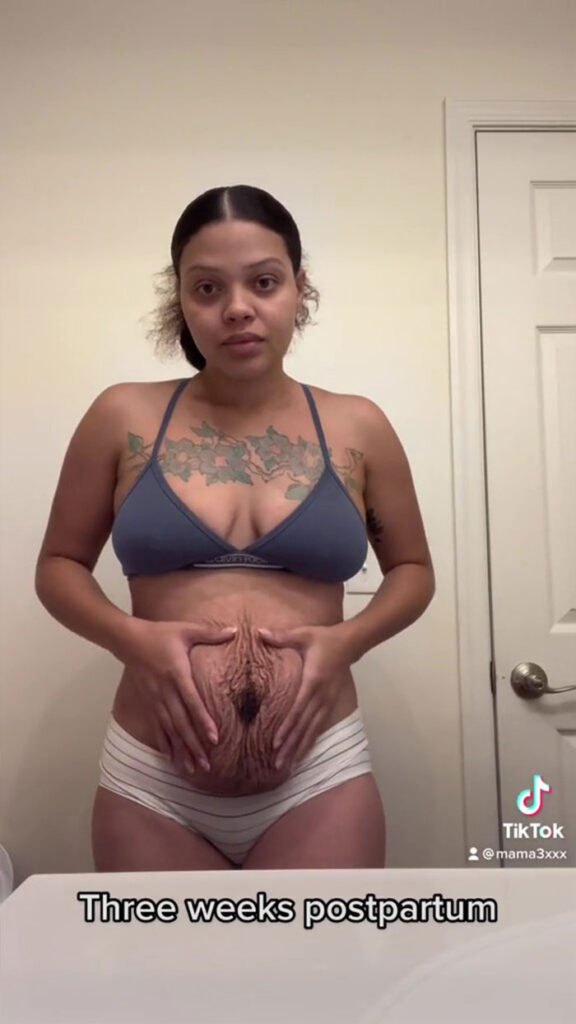Danisha’s one-week postpartum photo got over 300,000 views. In her post, she shared a quote from Lestaevel:

“When we criticize ourselves—whether it’s about our body or something else—we create resistance inside us. It blocks our natural energy and peace.”
Just two weeks after giving birth, Danisha’s videos had already reached nearly 16 million views. She used her platform to remind everyone how amazing the human body is — especially for simply keeping us alive. She encouraged people to accept their bodies as they are, even if they don’t love them. After all, our bodies create life — and that’s pretty incredible. As she says,
“Our bodies are meant to be and do, not just look a certain way.”

Then came her three-week postpartum post — wrinkles, stretch marks, and all. That video exploded with over 19 million views. The response on TikTok was mixed.
Some people appreciated her honesty and praised her for showing a side of motherhood that’s usually hidden. Others were shocked, with a few commenting things like,
“I’m never having kids.”
But many supported her and all moms, calling them strong and brave.
Danisha’s journey shows that we’ve made progress in how we talk about post-baby bodies — but there’s still a lot of work to do in truly normalizing them.
💬 The Comment Section Became a Sisterhood
One mom wrote,
“I thought something was wrong with me. You made me feel normal.”
Another said,
“I cried watching this. Finally, someone said it.”
The video became a support group disguised as a comment thread.
🧘♀️ Smashing the “Snapback” Lie
The “snapback” trend?
A toxic myth that a woman’s body should magically go back to its pre-baby state. Fast.
Sarah’s video tore that lie apart.
She showed her belly rolls, stretch marks, and C-section scar.
And proudly said,
“This is what a warrior looks like.”
📸 Real Bodies, Real Stories
She shared photos many hide:
- Postpartum belly
- Hospital mesh underwear
- Crying selfies
Each one whispered, “You’re not alone.”
🤳 The Social Media Trap
From celebrities to influencers, postpartum looks have become a showreel of perfection.
But real moms know:
- The glam pics are fake
- The pressure is real
- And the silence is harmful
Sarah’s post busted open that illusion.
🧠 Let’s Talk Mental Health
Sarah also shared her battles with:
- Postpartum depression
- Anxiety attacks
- Loneliness
She said she wished more moms spoke about this.
So she became that mom.
🫂 From Shame to Solidarity
Sarah didn’t just vent—she invited others to share their stories.
The result? A flood of videos, duets, and stories echoing hers.
Pain connected them.
Honesty united them.
🏥 Gaps in Healthcare Awareness
She also pointed out how little she was told after giving birth.
No one warned her:
- The bleeding would last weeks
- Her emotions would be a rollercoaster
- That sex might feel different
Now, her content includes educational clips to fill that gap.
💼 Calling Out Influencers and Brands
Sarah called on brands to:
- Stop using photoshopped models
- Include stretch marks, scars, and all
- Partner with real moms
Some brands took note. Others stayed silent.
🌍 One Post, One Movement
Her hashtag #ThisIsPostpartum started trending.
Thousands joined.
Stories poured in.
The movement had begun.
🧠 What We Can All Learn
Whether you’re a parent or not, Sarah’s story reminds us to:
- Listen without judgment
- Encourage vulnerability
- Celebrate truth over appearance
🖤 Final Thoughts: This is Motherhood, Unfiltered
Sarah’s not trying to go viral again.
She just wants one thing:
For no mom to ever feel ashamed of what’s normal.
She reminds us that the most powerful stories aren’t the perfect ones—they’re the real ones.
❓FAQs
1. Why did Sarah’s TikTok video go viral?
Because it showed real postpartum struggles, something rarely seen online, and many moms related to it.
2. What is “snapback culture”?
It’s the unrealistic expectation that women should return to their pre-pregnancy body immediately after giving birth.
3. How can I support a new mom emotionally?
Listen, be present, validate her feelings, and don’t judge her appearance or choices.
4. Are postpartum struggles common?
Yes, both physically and emotionally. Most women go through challenges that aren’t often discussed openly.
5. What can we do to change unrealistic post-pregnancy standards?
Speak up, share real stories, support campaigns like #ThisIsPostpartum, and hold media/influencers accountable.
